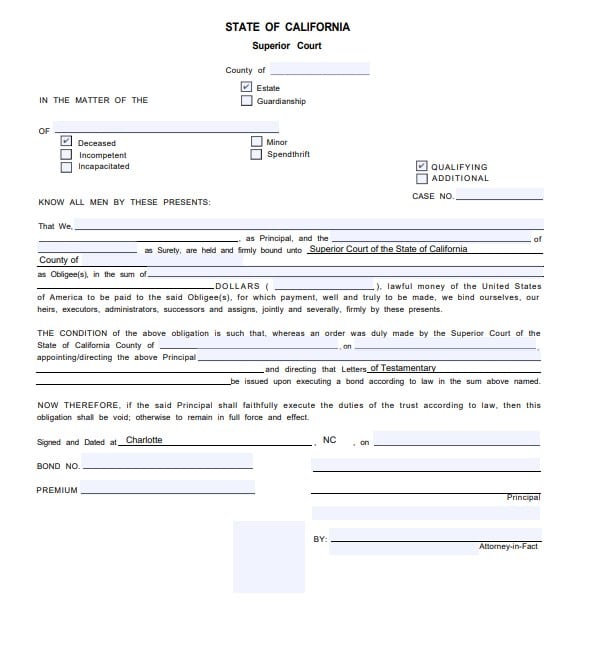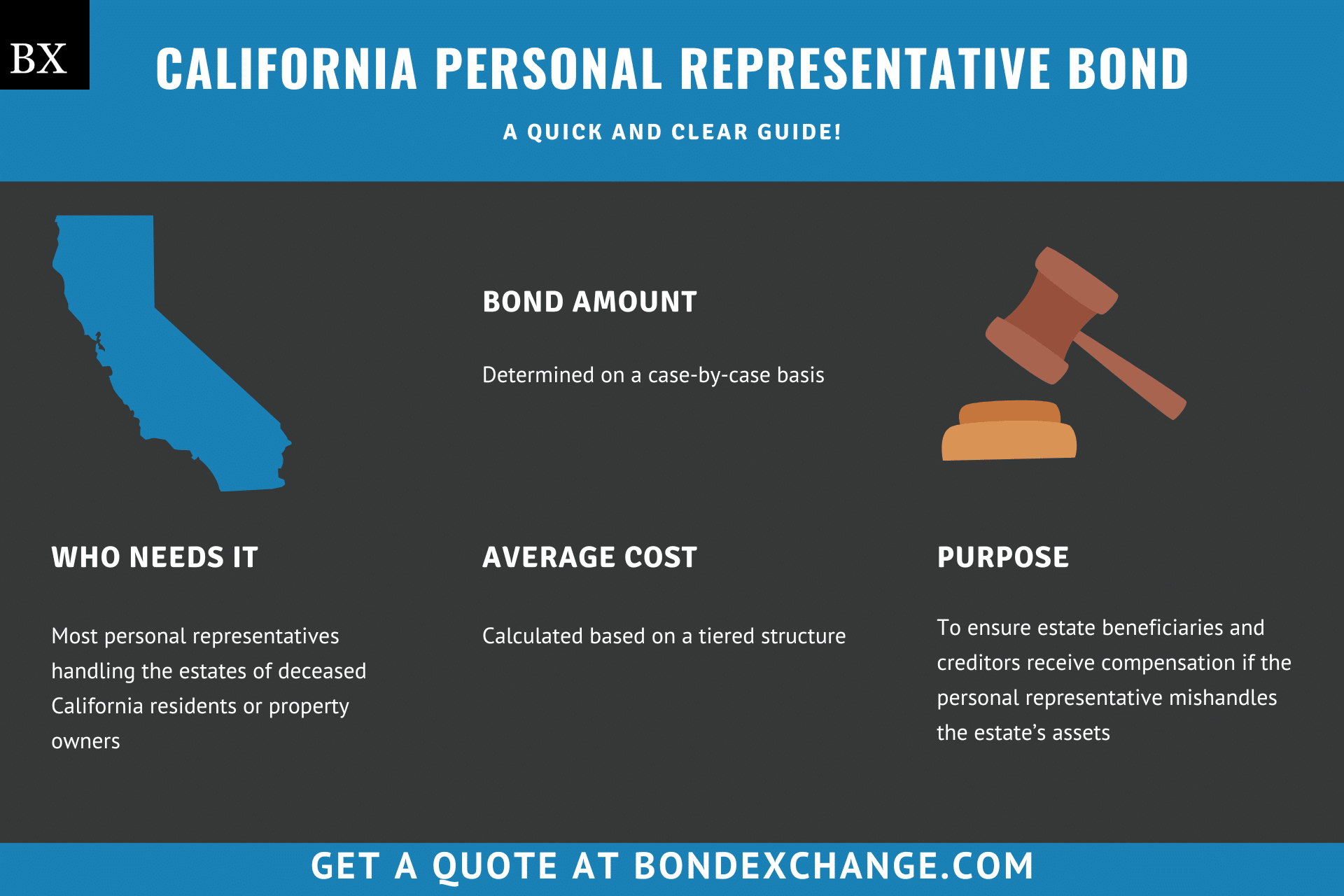California Personal Representative Bond: A Comprehensive Guide
This guide provides information for insurance agents to help their customers obtain a California Personal Representative bond.
At a Glance:
- Average Cost: Calculated based on a tiered structure
- Bond Amount: Determined on a case-by-case basis (more on this later)
- Who Needs it: Most personal representatives handling the estates of deceased California residents or property owners
- Purpose: To ensure estate beneficiaries and creditors receive compensation if the personal representative mishandles the estate’s assets
- Who Regulates Personal Representatives in California: The superior court of the county with jurisdiction over where the deceased individual resided or had property

Background
California Statute 8400 requires all personal representatives of an estate to be appointed by a court before assuming their fiduciary duties. The California legislature enacted the appointment requirement to ensure that personal representatives do not mismanage the estate’s assets. To provide financial security for the enforcement of this requirement, the court may require the personal representative to purchase a probate surety bond to be eligible for appointment.
What is the Purpose of the California Personal Representative Bond?
California requires personal representatives to purchase a surety bond as a prerequisite to being appointed as a fiduciary over an estate’s assets. The bond ensures that the estate’s beneficiaries and creditors will receive compensation for financial harm if the personal representative fails to abide by the regulations outlined in California Statute 8480. Specifically, the bond protects beneficiaries and creditors if the personal representative engages in acts of fraud or mismanages the estate’s assets. In short, the bond is a type of insurance that protects the estate’s beneficiaries and creditors if the personal representative violates their fiduciary duties.
How Can an Insurance Agent Obtain a California Personal Representative Surety Bond?
BondExchange makes obtaining a California Personal Representative bond easy. Simply login to your account and use our keyword search to find the “Probate” bond in our database. Don’t have a login? Gain access now and let us help you satisfy your customers’ needs. Our friendly underwriting staff is available by phone (800) 438-1162, email or chat from 7:30 AM to 7:00 PM EST to assist you.
At BondExchange, our 40 years of experience, leading technology, and access to markets ensures that we have the knowledge and resources to provide your clients with fast and friendly service whether obtaining quotes or issuing bonds.
Not an agent? Then let us pair you with one!

Click the above image to find a BX Agent near you
How is the Bond Amount Determined?
California Statute 8482 grants the superior court the authority to determine the required bond amount on a case-by-case basis. However, the statute dictates that the bond amount may not exceed the estimated value of the estate’s personal property plus the estimated annual gross income the estate will generate, and if independent administration is granted to any real property, the estimated value of the deceased individual’s interest in the property. The bond amount may be reduced by the amount of the estate’s property deposited in an insured financial institution, provided the assets may not be withdrawn without court approval.
Personal representatives may petition the court to reduce their required bond amount.
What are the Underwriting Requirements for the California Personal Representative Bond?
Most surety companies will examine the following factors when determining eligibility for the California Personal Representative bond:
- Personal representative’s credit history (not considered for bonds with limits less than $25,000)
- Whether or not the estate has an attorney (not considered for bonds with limits less than $25,000)
- How long the fiduciary appointment is for
- Whether or not the personal representative is replacing a prior fiduciary
- If the personal representative has ever committed a felony
- If there are disputes among the estate’s beneficiaries
- Whether or not there is any ongoing business in the estate
- If the bond is being required by a creditor
How Much Does the California Personal Representative Bond Cost?
Surety companies typically determine the premium rate for personal representative bonds based on a tiered structure. As a result, larger bond amounts will be charged a lower premium rate than smaller bonds.
The following table illustrates the pricing structure for the California Personal Representative bond:
$1,500,000 Personal Representative Bond Cost
| Bond Amount | Premium Rate | Total Bond Cost |
|---|---|---|
| First $20,000 | 0.75% | $150 |
| Next $40,000 | 0.60% | $240 |
| Next $140,000 | 0.50% | $700 |
| Next $300,000 | 0.375% | $1,125 |
| Next $1,000,000 | 0.25% | $2,500 |
| Total cost of $4,715 |
Who is Required to Purchase the California Personal Representative Bond?
California requires personal representatives to purchase a surety bond as a prerequisite to obtaining a fiduciary appointment. To paraphrase California Probate Code Section 20-88, a personal representative is a court-appointed fiduciary responsible for administering a deceased individual’s estate. Personal representatives are referred to as executors if the deceased individual nominated them in their will, or administrators if they were not nominated in the will or if no will exists.
Personal representatives are not required to purchase a bond if:
- The will explicitly waives the bond requirement
- All of the estate’s beneficiaries agree in writing to waive the bond requirement

How do Personal Representatives Become Appointed in California?
Personal representatives in California must navigate several steps to become court-appointed fiduciaries. Below are the general guidelines, but applicants should refer to California’s probate statutes as well as the state’s wills, estates, and probate page for details on the process.
Step 1 – Meet the Qualifications
Personal representatives are ineligible for appointment if they are:
-
- Under the age of 18
- Subject to a conservatorship or are otherwise incapable of fulfilling their duties
- Disqualified due to any of the causes outlined in Section 8502
- Not a resident of the United States (unless the will nominates them)
- A business partner of the deceased individual and an interested person objects to their appointment (unless the will nominates them)
Step 2 – Determine Priority
Priority to serve as a personal representative is granted in the following order:
-
- Persons nominated in the will
- Surviving spouse or domestic partner
- Children
- Grandchildren
- Other issue
- Parents
- Brothers and sisters
- Issue of brothers and sisters
- Grandparents
- Issue of grandparents
- Children of a predeceased spouse or domestic partner
- Other issue of a predeceased spouse or domestic partner
- Any other next of kin
- Parents of a predeceased spouse or domestic partner
- Issue of parents of a predeceased spouse or domestic partner
- The conservator or guardian of the estate that was in that capacity at the time of death and is not acting as a conservator or guardian for another person
- Public administrator
- Creditors
- Any other qualified person
Step 3 – Hire an Attorney
Although not explicitly required, it is highly recommended that personal representatives hire an attorney to assist with the probate process.
Step 4 – Contact the Court
Personal representatives must contact the superior court of the county with jurisdiction over the deceased individual’s estate. A representative of the court will walk the personal representative through the appointment process, provide them with all required forms, and answer any questions they may have.
If the estate is subject to formal probate, then a hearing will be required to determine the validity of the will and to appoint a personal representative.
Any interested person may object to the personal representative’s appointment.
Step 5 – Purchase a Surety Bond
Unless otherwise exempt, personal representatives must purchase and maintain a surety bond (limits outlined above).
How do California Personal Representatives File Their Bonds?
Personal representatives should submit their completed bond forms, including the power of attorney, to the superior court of the county with jurisdiction over the estate.
The surety bond requires signatures from the company that issues the bond and the personal representative. The surety company should include the following information on the bond form:
- Court where the bond is to be filed
- Name of deceased individual
- Legal name of the entity/individual(s) buying the bond
- Surety company’s name and state of incorporation
- Bond amount
- Date the fiduciary appointment was made
- Date the bond is signed
What can California Personal Representatives do to Avoid Claims Made Against Their Bonds?
To avoid claims against their bonds, personal representatives in California must ensure that they:
- Do not mismanage the estate’s assets
- Fulfill their fiduciary duties
